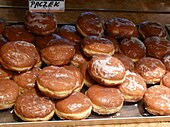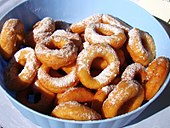Pączki
 Glazed pączki | |
| Alternative names | kreple, ponchik |
|---|---|
| Type | Doughnut |
| Place of origin | Poland |
| Region or state | |
| Main ingredients | grain alcohol, confiture or other sweet filling, powdered sugar, icing, glaze, or bits of dried orange zest |
Pączki (Polish: [ˈpɔnt͡ʂkʲi] ⓘ; sg.: pączek, Polish: [ˈpɔnt͡ʂɛk]; Kashubian: pùrcle; Old Polish and Silesian: kreple) are filled doughnuts found in Polish cuisine.
Description
A pączek is a
Although they look like German
Pączki have been known in
-
Pączki displayed for sale
-
Traditional pączki serowe or oponki
-
Home-made glazed pączki
-
American-made pączki
Etymology, spelling, and pronunciation
The Polish word pączek
English speakers typically use the plural form of the Polish word in both singular and plural. They pronounce it as /ˈpʊntʃki, ˈpʊnʃ-, ˈpʌntʃ-, ˈpɒntʃ-/[d] and often write it as "paczki", i.e., without the ogonek (hook-shaped diacritic).[12][13][14][15] This should not be confused with the unrelated Polish word paczki [ˈpat͡ʂkʲi], which is the plural form of paczka [ˈpat͡ʂka], meaning "package" or "parcel".[16]
Pączki Day
| Sunday | Monday | Tuesday | Wednesday | (Tłusty Czwartek) |
Friday | Saturday | ||
| Sunday | Monday | Fat Tuesday (Pączki Day) |
Ash Wednesday | Thursday | Friday | Saturday | ||
| ||||||||
In Poland, pączki are eaten especially on Fat Thursday (Tłusty Czwartek), the last Thursday prior to Ash Wednesday and the beginning of Lent.[17] The traditional reason for making pączki was to use up all the lard, sugar, eggs and fruit in the house, because their consumption was forbidden by Christian fasting practices during the season of Lent.[citation needed]
In North America, particularly the large
The Pączki Day celebrations in some areas are even larger than many celebrations for
In some areas, Pączki Day is celebrated with pączki-eating contests.[citation needed]
United States
This article needs additional citations for verification. (February 2018) |
These pastries have become popular in the United States as a result of
See also
Explanatory notes
- ^ Russian: пончик.
- ^ Ukrainian: пончик, Belarusian: пончык.
- ^ Bulgarian: поничка.
- ^ Respelling: PUUNCH-kee, PUUNSH-, PUNCH-, PONCH-.
Citations
- ^ ISBN 9780781811248.
- Grupa Interia.pl. Retrieved 2016-02-03.
- Grupa Interia.pl. Retrieved 2016-02-03.
- ^ "Pączki? Hard to say, culinary Lenten treat made by nuns". Catholic News Service. Archived from the original on February 28, 2014. Retrieved November 23, 2009.
- ^ a b "Pazcki day- eat and celebrate". City of Hamtramck. Archived from the original on March 15, 2008.
- ^ Żmigrodzki, "pączek".
- ^ Bralczyk (2014), p. 127.
- ^ Derksen (2008), pp. 416–417.
- ^ Ushakov (1940), пончик.
- ^ Boldyrev (2003), p. 514.
- ^ Georgiev (1999), p. 517.
- ^ Dictionary.com, paczki.
- ^ American Heritage Dictionary, paczki.
- ^ Barber 2004, paczki.
- ^ Edge (2006), chapter 7.
- ^ Żmigrodzki, "paczka".
- ISBN 9788370019488.
- ^ Lukach, Adam (23 February 2017). "Paczki day specials from 33 Chicago restaurants and bakeries". Chicago Tribune. Retrieved 26 February 2017.
Whether you celebrate Paczki day on Fat Thursday or Fat Tuesday, or both, area bakeries are ready with thousands of the filled treats.
- ^ "Fat Tuesday Can Be Paczki Pandemonium". Southfield, MI: WWJ-TV. Retrieved 21 February 2012.
- Cleveland.com. Retrieved 27 February 2022.
General and cited sources
- "American Heritage Dictionary of the English Language". Retrieved 2018-02-02.
- Bańkowski, Andrzej, ed. (2000). Etymologiczny słownik języka polskiego [Polish etymological dictionary] (in Polish). Vol. 1. Wydawnictwo Naukowe PWN.
- ISBN 978-0-19-541816-3. Retrieved 2016-12-23.
- Bizzarri, Amy, ed. (2016). Iconic Chicago Dishes, Drinks and Desserts. Charleston, SC: American Palata. ISBN 978-1-46713-551-1.
- Boldyrev, R. V. (2003). Melnichuk, O. S. (ed.). Etimologichnyi slovnyk ukrayinskoi movi Етимологічний словник української мови [Etymological Dictionary of Ukrainian Language] (in Ukrainian). Vol. 4. Kyiv: Naukova dumka. ISBN 966-00-0590-3.
- Bralczyk, Jerzy (2014). Jeść!!! [Let me eat!] (in Polish). BOSZ. ISBN 978-83-7576-218-1.
- Czerniecki, Stanisław (1682). Compendium ferculorum, albo Zebranie potraw [A Collection of Dishes] (in Polish). Kraków: Drukarnia Jerzego i Mikołaja Schedlów.
- "Dictionary.com Unabridged". Random House. Retrieved 2018-02-02.
- Doroszewski, Witold, ed. (1969). "Słownik Języka Polskiego" [Polish Dictionary] (in Polish). Warszawa: Państwowe Wydawnictwo Naukowe.
- Dumanowski, Jarosław; Jankowski, Rafał, eds. (2011). Moda bardzo dobra smażenia różnych konfektów [A Very Good Way of Frying Various Confections]. Monumenta Poloniae Culinaria (in Polish). Vol. 2. Warszawa: Muzeum Pałac w Wilanowie. ISBN 978-83-60959-18-3.
- Dumanowski, Jarosław (2016). "Pączki z przeszłości, czyli tłusty czwartek historycznie" [Pączki of the past, or Fat Thursday in history]. naTemat.pl. Retrieved 2018-02-06.
- Edge, John T., ed. (2006). Donuts: An American Passion. New York: G.P. Putnam's Sons. ISBN 978-1-440-62864-1.
- Georgiev, Vladimir Ivanov (1999). Blgarski etimologichen rechnik Български етимологичен речник [Bulgarian Etymological Dictionary] (in Bulgarian). Vol. 1. Marin Drinov. ISBN 978-95-4430-315-0.
- Kitowicz, Jędrzej (1840). Opis obyczajów i zwyczajów za panowania Augusta III [Description of customs and habits under Augustus III] (in Polish). Poznań: Edward Raczyński.
- ISBN 83-89763-25-7.
- Lemnis, Maria; Vitry, Henryk (1979). W staropolskiej kuchni i przy polskim stole [Old Polish Traditions in the Kitchen and at the Table] (in Polish). Warszawa: Interpress.
- "Lista produktów tradycyjnych" [List of traditional products] (in Polish). Ministerstwo Rolnictwa i Rozwoju Wsi. Archived from the original on 2018-05-24. Retrieved 2016-06-15.
- Łozińska, Maja; Łoziński, Jan (2013). Historia polskiego smaku: kuchnia, stół, obyczaje [History of the Polish Taste: Kitchen, Table, Customs] (in Polish). Warszawa: Wydawnictwo Naukowe PWN. ISBN 978-83-7705-269-3.
- Mish, Frederick C. (2004). Merriam-Webster's Collegiate Dictionary (11th ed.).
- Neilson, William Allan; Knott, Thomas A.; Carhart, Paul W. (1947) [1934]. Webster's New International Dictionary (2nd ed.).
- Strybel, Robert; Strybel, Maria (2005) [1993]. Polish Heritage Cookery. New York: Hippocrene Books. ISBN 0-7818-1124-4.
- Szymula, Elzbieta (2012). "Polish Diet". In Thaker, Aruna; Barton, Arlene (eds.). Multicultural Handbook of Food, Nutrition and Dietetics. Wiley-Blackwell. pp. 277–295. ISBN 978-1-4051-7358-2.
- Szymanderska, Hanna (2010). Kuchnia polska: Potrawy regionalne [Polish Cuisine: Regional Dishes] (in Polish). Warszawa: Świat Książki. ISBN 978-83-7799-631-7.
- Ushakov, Dmitry Nikolayevich (1940). "Tolkovy slovar russkogo yazyka" Толковый словарь русского языка [Explanatory Dictionary of the Russian Language]. Akademik (in Russian). Moskva: Sovetskaya entsiklopediya.
- Żmigrodzki, Piotr (ed.). "Wielki Słownik Języka Polskiego" [The Great Polish Dictionary] (in Polish). Instytut Języka Polskiego PAN.
External links
- Paczki Day PSA, an account of Paczki Daytraditions in 2008
- Paczkis Video produced by Wisconsin Public Television





